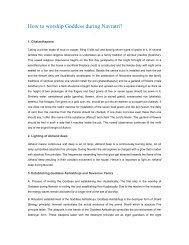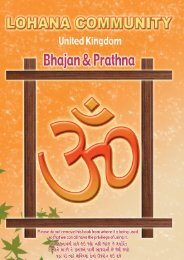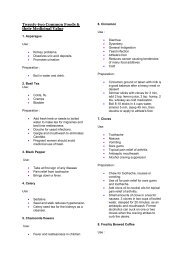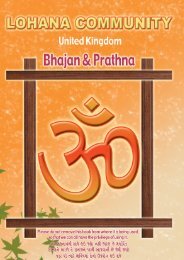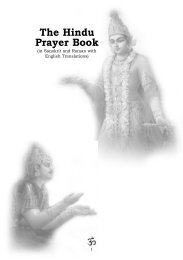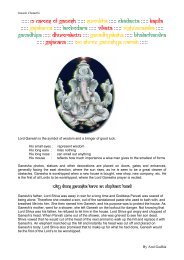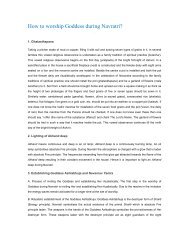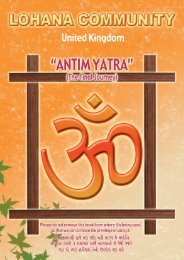It may be said with some degree of certainty that ... - Lohana.info
It may be said with some degree of certainty that ... - Lohana.info
It may be said with some degree of certainty that ... - Lohana.info
You also want an ePaper? Increase the reach of your titles
YUMPU automatically turns print PDFs into web optimized ePapers that Google loves.
A Buddhist Bible, written by in Dwight Goddard in 1932, echoes this vegetarian sentiment. This book strongly<br />
influenced the growth <strong>of</strong> Buddhism in the English-speaking world during the 20th century. <strong>It</strong> is famous for its<br />
transformation effect on <strong>be</strong>at writers such as Jack Kerouac. "The reason for practicing dhyana (meditation) and<br />
seeking to attain samadhi (mystic contemplation) is to escape from the suffering <strong>of</strong> life, " writes Goddard. "But in<br />
seeking to escape from suffering ourselves, why should we inflict it upon others? How can a bhikshu (seeker), who<br />
hopes to <strong>be</strong>come a deliverer <strong>of</strong> others, himself <strong>be</strong> living on the flesh <strong>of</strong> other sentient <strong>be</strong>ings?"<br />
The vegetarian flavour <strong>of</strong> the faith found fertile fields when Buddhism spread to China and Japan, where a nonviolent,<br />
meat-free culture had long <strong>be</strong>en an established way <strong>of</strong> life. According to The Encyclopaedia <strong>of</strong> Buddhism, "In China<br />
and Japan the eating <strong>of</strong> meat was looked upon as an evil and was ostracized. The eating <strong>of</strong> meat gradually ceased<br />
and this tended to <strong>be</strong>come general. <strong>It</strong> <strong>be</strong>came a matter <strong>of</strong> course not to use any kind <strong>of</strong> meat in the meals <strong>of</strong> temples<br />
and monasteries."<br />
Buddhism entered China during the Han dynasty (206 bce--220 ce) when Confucianism and Taoism were already well<br />
established. The Chinese worshiped ancestral deities and followed strict dietary rules. Certain foods--pork, for<br />
example--were <strong>said</strong> to make the breath "obnoxious to the ancestors " and were frowned upon.<br />
Ancient Japanese lived primarily on vegetables, rice and grains. When Buddhism <strong>be</strong>gan to gain a stronghold in Japan<br />
during the sixth century, the nation had already absor<strong>be</strong>d much <strong>of</strong> Chinese culture. Chinese Buddhism blended<br />
compatibly <strong>with</strong> the Shintoism <strong>of</strong> Japan, which was significantly vegetarian. According to Shinto tradition, no animal<br />
food is <strong>of</strong>fered at a shrine, as it is taboo to shed blood in a sacred place. Today, the Buddhism <strong>of</strong> Japan constitutes a<br />
merge <strong>of</strong> Shintoism <strong>with</strong> Chinese Buddhism. Although eating meat, especially fish, is common in the Japanese<br />
Buddhist community, the deeply religious still consider it an inferior practice. No meat or fish is ever consumed in a<br />
Zen Buddhist monastery.<br />
Today, most Buddhists are not vegetarian, though contemporary Buddhist movements, such as Buddhists Concerned<br />
for Animal Rights, are seeking to re-establish vegetarian ideals. One Buddhist denomination, called the Cao Dai sect,<br />
has two million vegetarian followers.<br />
The greatest progress <strong>of</strong> righteousness among men comes from the exhortation in favour <strong>of</strong> non-injury to life and<br />
abstention from killing. The Edicts <strong>of</strong> Ashoka<br />
Judaism<br />
Jewish scholars <strong>be</strong>lieve God intended man to <strong>be</strong> vegetarian<br />
Although ancient Hebrews ate meat, they did so sparingly. This restraint was not religiously or even ethically<br />
motivated. Meat was expensive and its consumption was a luxury. As an agrarian society, biblical Jews used animals<br />
mainly for labour and were largely vegetarian. They also consumed a great quantity <strong>of</strong> milk and milk products, mainly<br />
from sheep and goats.<br />
Today most Jews live on a predominantly meat-based diet. A typical Jewish simcha (private celebration) consists <strong>of</strong><br />
brisket, gefilte fish cakes, fish and chicken soup or chopped liver. Ro<strong>be</strong>rta Kalech<strong>of</strong>sky points out in Vegetarian<br />
Judaism--A Guide for Everyone <strong>that</strong> "Western Jews have historically eaten as much meat as the non-Jews; and due<br />
to their growing prosperity, European Jews have started to fully identify themselves <strong>with</strong> the meat-based diet."<br />
Scholars <strong>of</strong> Judaism agree <strong>that</strong> God's intention was for man to <strong>be</strong> vegetarian. "God did not permit Adam and his wife<br />
to kill a creature and to eat its flesh,'' <strong>said</strong> Rashi, a highly respected, 12th-century, Jewish rabbi who wrote the first<br />
comprehensive commentaries on the Talmud and Tanakh. Ronald Isaacs states in Animals in Jewish Thought and<br />
Tradition <strong>that</strong> all Talmudic rabbis conclude <strong>that</strong> "the permission to eat meat [was granted to human kind] as a<br />
compromise, a divine concession to human weakness and human need." Rabbi Elijah Judah Schochet, in Animal Life<br />
in Jewish Tradition, notes <strong>that</strong> "scripture does not command the Israelite to eat meat, but permits this diet as a<br />
concession to lust."<br />
Jewish dietary laws are unique in including a prohibition against mixing meat and milk: "You shall not seethe a kid in<br />
its mother's milk" (Exodus 23:19). This mandate <strong>of</strong> not boiling a young goat in the milk <strong>of</strong> its mother is an elaboration<br />
<strong>of</strong> the command against cruelty to animals. Also, <strong>be</strong>cause <strong>of</strong>fering meat boiled in milk was a pagan form <strong>of</strong> hospitality,<br />
Jews saw ruling against the practice as a way <strong>of</strong> distancing themselves from pagan ways.<br />
Judaism prohibits the consumption <strong>of</strong> blood: "Only flesh <strong>with</strong> the life there<strong>of</strong>, which is the blood there<strong>of</strong>, shall you not<br />
eat" (Genesis 9:4). "You shall eat the blood <strong>of</strong> no manner <strong>of</strong> flesh; for the life <strong>of</strong> all flesh is the blood there<strong>of</strong> " Leviticus<br />
17:14). The rationale <strong>be</strong>hind this injunction is <strong>that</strong> life <strong>be</strong>longs to God, and blood is life. "Blood is the life, and you shall<br />
not eat the life <strong>with</strong> the flesh" (Deuteronomy 12:23).<br />
In Jewish tradition, only certain animals are suitable as food. According to Elijah Schochet in his book Animal Life in<br />
Jewish Tradition: "Only quadrupeds which chewed their cud and had parted ho<strong>of</strong>s, such as the cow, sheep, goat,<br />
gazelle and male deer, were fit for food, these <strong>be</strong>ing by and large the herbivorous ruminants. Animals possessing only<br />
one <strong>of</strong> the two required characteristics, however, such as the camel, the badger and the pig, were forbidden, as <strong>of</strong><br />
course, were animals which neither had split ho<strong>of</strong>s nor chewed their cud. Animals which died <strong>of</strong> natural causes were



